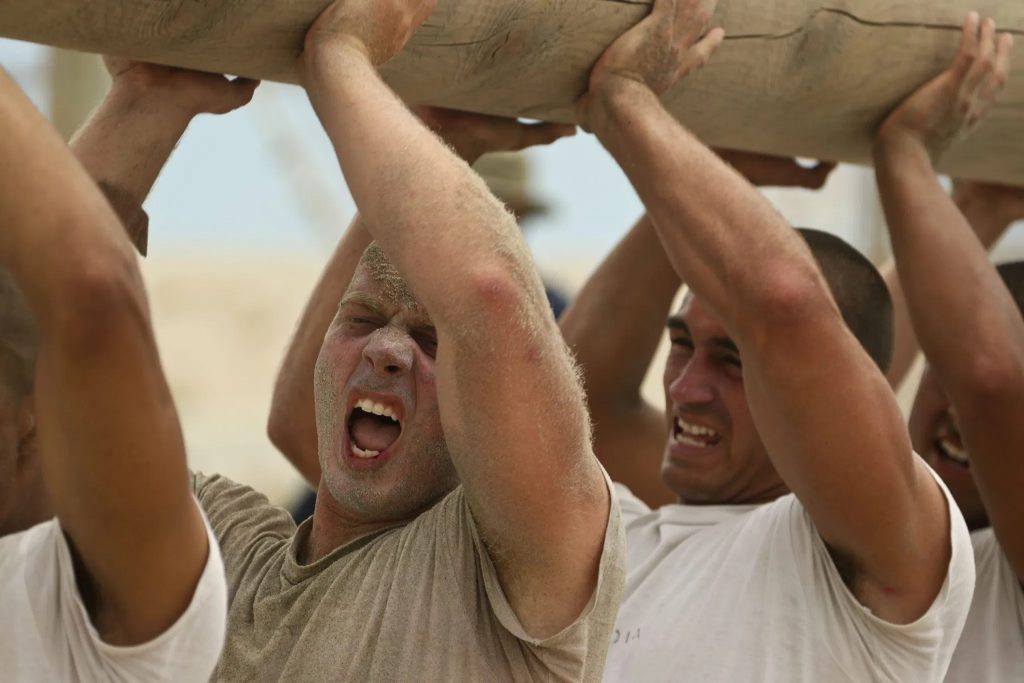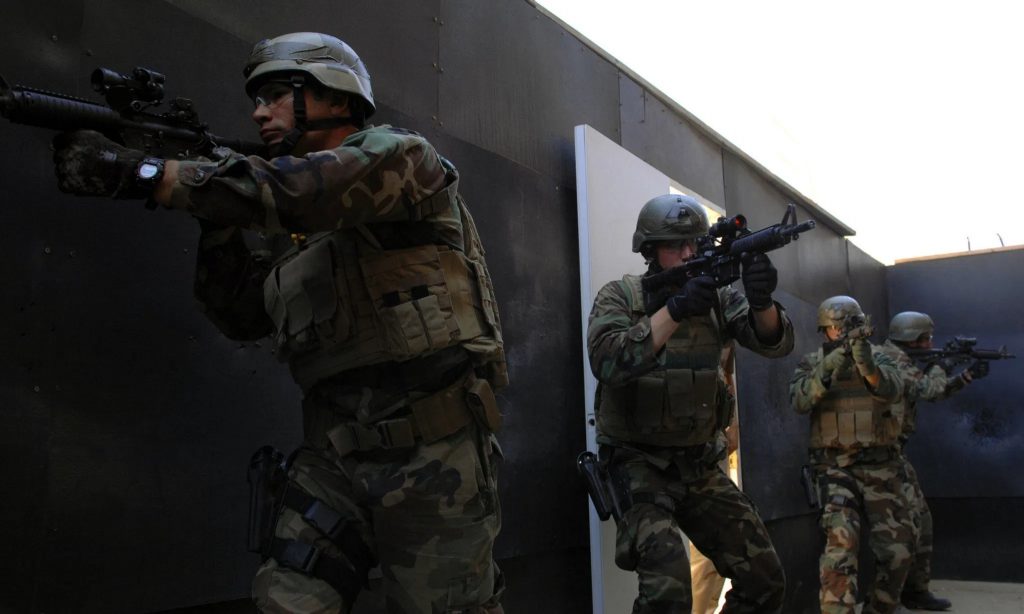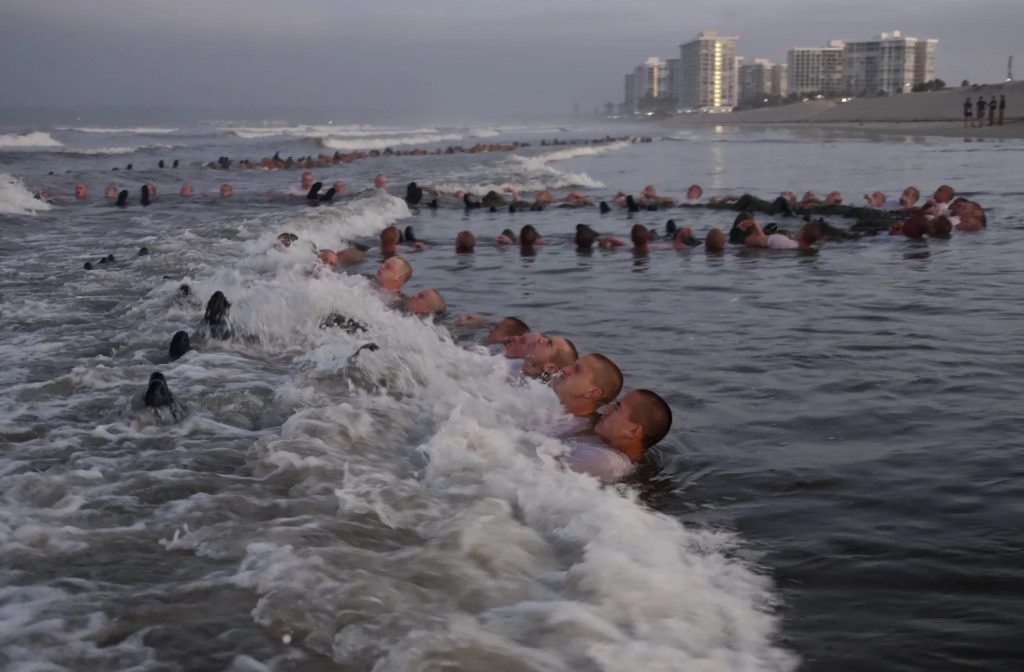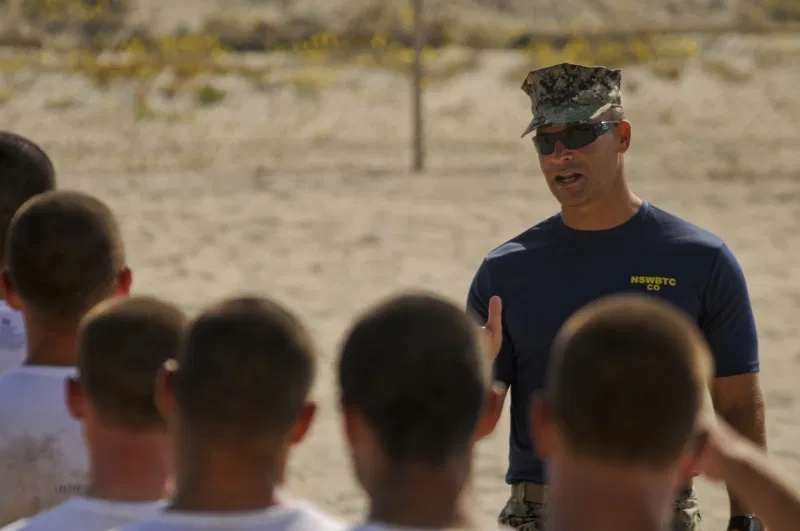By Javier Romero
What makes Navy SEAL training so hard? How do SEAL candidates prepare for the tests they have to endure during training? What does it take to successfully get through this training? Why does such a low percentage of candidates obtain the coveted Navy SEAL trident? These are some of the questions that help build the mystique and narrative around Navy SEAL training.
Yet, all these questions focus on the candidates, on those hoping to become members of arguably the most elite military group in the world. But what about the ones setting the bar, sharpening the iron, molding the men hoping of becoming part of this select cohort? What about the trainers and instructors who know what it takes to get there?

A Team Effort
While SEAL training might seem like an individual journey in which the personal abilities and limits of each candidate are pushed to the maximum, you’ll find that trainers focus on the opposite: collective character.
“They say that in SEAL teams, individuals don’t make it through Hell Week; only teams do,” says Sean Haggerty, a former Navy SEAL, and current instructor referencing the famously toughest week of SEAL training.
After participating in an “express” version of SEAL training directed by Haggerty, a sneak peek consisting of performing a few of the drills that recruits have to complete, former NFL Pro Bowl wide receiver Vincent Jackson echoed his instructor’s words.
“The synergy, the alignment I see [between the military and professional sports] is just the teamwork. It’s about the ability to not be an individual, to make the sacrifice, to understand that the greater good of the whole is always going to be more important than the individual.”

This collective component of SEAL training, which Haggerty and Jackson emphasize, is often overlooked. Its importance is based on the simple reason that overcoming the obstacles present in the training is completely impossible if you are only equipped with a “lone wolf” mentality. Forget the epic movie scenes in which elite military operators are depicted as one-man bands capable of single-handedly taking out enemy troops. The tremendously challenging operations that SEALs undertake can only be successfully fulfilled if they work as a team.
That chemistry, that bond that brings the whole team together, starts to form from the very beginning, particularly through the shared pain and discomfort that all recruits experience as an inevitable element of their training. “When you come together through physical adversity, it forms that team mentality we’re looking for,” says Richard Thompson, a former U.S. Navy SEAL.
The Power of the Mind
In addition to camaraderie and a team-oriented mindset, there is another component that is absolutely fundamental to have the slightest chance of completing SEAL training: mental toughness.
Admiral William McRaven, in an interview with PBS NewsHour on the raid that killed Osama bin Laden in 2011, which he was responsible for overseeing and executing, mentioned the one ingredient he thinks is absolutely necessary to withstand adverse circumstances and overcome the toughness and difficulties of SEAL training.
“SEAL training really doesn’t have a lot to do with how big and how strong and how fast you are. There’s only one thing you have to do in SEAL training. And that’s not quit.
So, the one thing that defines everybody that goes through SEAL training is that they didn’t ring the bell, as we say. They didn’t quit. And that’s really what you’re trying to find in the young SEAL students, because, in the course of your career, you’re going to be cold, wet, miserable. You’re going to kind of fail often as a result of bad missions, bad training, and we need people that can persevere through all of that.”

As McRaven points out, instructors are not interested in athleticism or outstanding technical skills. At least, these are not the main traits they are looking for. Instead, there is one common thread that all of these traits point to: the ability to never give up. This one strength might seem obvious or over-simplified, but military trainers insist on it as a key for success. They impart their training based on the mindset that if SEAL-hopefuls are able to withstand whatever the trainers have ready for them, they will be successful on the battlefield.
“While it is important to be physically fit when you go through training, you find out very quickly that your background, your social status, your color, your orientation, none of that matters. The only thing that matters is that you go in with this purpose in mind and the thought that you are just not going to quit, no matter what happens.”
Notice how McRaven does mention physical fitness as an important element of success in SEAL training, but he deliberately lowers its relevance compared to mental or fitness. This assumption — that athleticism is paramount to succeed in military training — is perhaps the greatest misconception about this process.
While the physical tests are universal for all trainees, the mental battle varies drastically depending on each trainee’s mindset, fears, ambitions, etc. It is impossible to set a standard, an empirical blueprint, or formula to succeed at the mental level because each candidate has his very distinct, particular inner mental battle to fight.
Navy SEAL Means Never Quit
It is no secret that SEAL training involves extremely difficult tests that exert outstanding amounts of pressure on the candidates on a physical, psychological, and emotional level. Maintaining perseverance, resilience, and fortitude in the face of these adverse situations, as McRaven says, is the common attribute instructors keep citing as the defining factor of success over failure. These principles are, in part, what enabled historical figures like James Stockdale or Victor Frankl to survive the worst conditions imaginable as prisoners of war. (Stockdale was a prisoner of war in Vietnam for more than seven years, and Frankl was a prisoner in four different Nazi concentration camps for more than three years.)
Frankl, a psychiatrist best known for developing logotherapy and recounting his dreadful experiences as a prisoner of the Nazis in his bestselling memoir Man’s Search for Meaning, reflected in the book these same principles for success that SEAL instructors refer to. He cited the choice of attitude as a non-negotiable component to generate hope, and ultimately success, no matter how harsh the circumstances might be.
“If […] one cannot change a situation that causes his suffering, he can still choose his attitude.”
Frankl was no SEAL instructor, but his teachings about survival in Nazi concentration camps can be equally applied to a process as challenging as SEAL training. In Man’s Search for Meaning, he provides an additional element that he found necessary to prevail over adversity: a clear, definitive future goal; a light at the end of the tunnel.
“Any attempt to restore a man’s inner strength in the camp had first to succeed in showing him some future goal. Nietzsche’s words, ‘He who has a why to live for can bear with almost any how,’ could be the guiding motto for all psychotherapeutic and psychohygienic efforts regarding prisoners.”

This future goal is the same for all SEAL candidates: to receive the U.S. Navy SEAL Trident that signals they have successfully undergone training and that they will be assigned to a SEAL Team or SEAL Delivery Vehicle Team.
The key question seems to be why is SEAL training so mentally challenging if all of the candidates know that there is an end, a future goal, just like the one Frankl talks about.
The answer, in a radical simplification, seems to have to do with the fact that SEAL training pushes candidates to their limits. It makes them see quitting as the path to get rid of the tremendous stress and suffering. That is why so few candidates complete the training. And that is why the key — as instructors themselves emphasize — is as simple, and at the same time as complex, as being a team player and not quitting.

